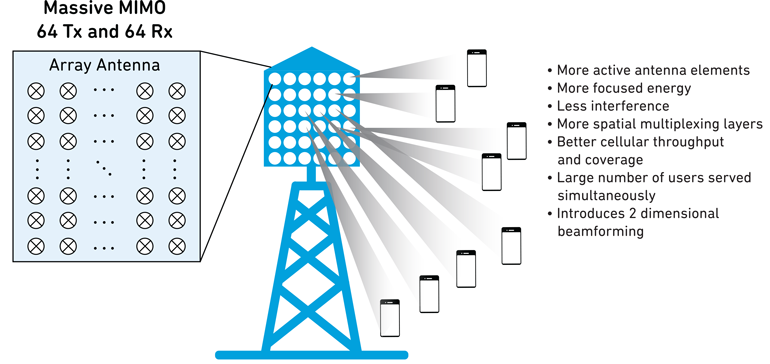Additional teaching materials for the Communication and Signal Processing (CSP) major of German-Russian Institute of Advanced Technologies (GRIAT): Multiple Input Multiple Output (MIMO) technology.
- Desirable background:
- Tutorials:
- Self-education:
This work is prepared for students of MS-CSP (Communication and Signal Processing) program (GRIAT) primarily. However, everyone who is interested in considered topics is welcome!
Why should you learn MIMO technology basics?
MIMO is a part of the most of modern wireless communication standards. For example, this is implemented in LTE/LTE-A networks and in Wi-Fi devices since 802.11n (Wi-Fi 4).
Moreover, the evolution of the MIMO - Massive MIMO is a part of the 5G networks. This fact means scientific interest, and science is impossible without basics.
Additionally, MIMO topic is a good opportunity to train your linear algebra skills!
- Paulraj, Arogyaswami, Rohit Nabar, and Dhananjay Gore. Introduction to space-time wireless communications. Cambridge university press, 2003.
- Salehi, M., and J. Proakis. "Digital communications." McGraw-Hill Education 31 (2007): 32.
- Haykin, Simon S. Digital communications. New York: Wiley, 1988.
- Goldsmith, Andrea. Wireless communications. Cambridge university press, 2005.
- Sklar, Bernard. Digital communications: fundamentals and applications. 2001.
The work on this project inspired me to write several popular science articles in my native language. Probably, it can be also helpful for someone:
- Оцениваем пропускную способность MIMO канала (алгоритм Water-pouring прилагается)
- MU-MIMO: один из алгоритмов реализации
- MIMO spatial diversity: Аламоути, DET и прочее пространственное разнесение
- Почти самый простой MIMO канал с замираниями (модель Кронекера прилагается)
And several matherials about adaptive and array signal processing:
- Adaptive beamforming (Python 3 source code)
- Adaptive filters (Python 3 / MATLAB source codes)
- Моделируем алгоритм MUSIC для задач определения направления прихода электромагнитной волны
- Оптимальная линейная фильтрация: от метода градиентного спуска до адаптивных фильтров
I'll be appreciate your stars because in my oppinion this is one of the brightest indicators of a good work!
You also can send your comments and suggestion by e-mail: vovenur@gmail.com
The feedback is valuable for me!
Have a nice reading, good day, and good luck!
M.Sc. Vladimir Fadeev

